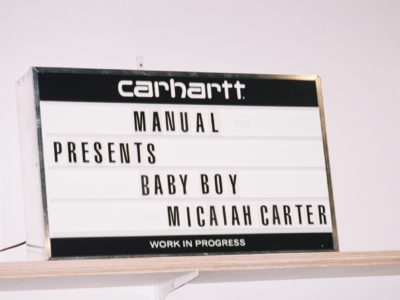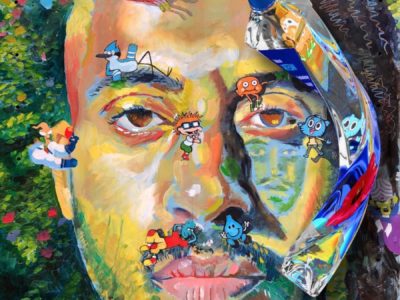
Vogue Paris‘s Joan Juliet Buck on the Price of Illusion
Vogue Paris‘s Joan Juliet Buck on the Price of Illusion
WORDS BY MICHAEL JOERRES | ALL PHOTOS COURTESY OF JOAN JULIET BUCK
The pages of Joan Juliet Buck’s memoir, The Price of Illusion, are infused with sun-drenched villas above Cannes and borrowed Saint Laurent couture. More unexpectedly, glamorous anecdotes are interlaced with devastating loss, sharp wit, and profound self-reflection.
Joan would eventually become known as the first American editor-in-chief of Vogue Paris in 1994. Before she was front row at Fashion Week, she was the daughter of famed Hollywood producer, Jules Buck, and grew up in the gilded palaces of post-war Europe with fellow expatriates. She was surrounded by beautiful people and beautiful clothes at all times. Taught at a young age that status was everything, Joan’s substance became all about surfaces.
In 2010, Buck’s dependence on an enchanting and superficial world placed her in the position to write a profile on the first lady of Syria that changed everything. In the quintessential Vogue manner, Buck’s editors published a piece that highlighted the glitz of Asma al-Assad. When violence in Syria erupted shortly thereafter, Joan was scapegoated for the puff piece.
In The Price of Illusion, Joan comes to terms with the world of make-believe that was her life. She learns to find joy in the simple things and the freedom that comes when illusions are shattered. We spoke with her to talk more about diving below the surface.
Why did you feel you were ready to write a memoir?
I felt that I really needed to figure out where I’d been and what my life choices were. It made me uncomfortable that people I didn’t know reacted to me as the former editor-in-chief of Vogue Paris and projected on me. Strangers wanted to meet an imperious fashion icon, but I had only taken on that job because I was blocked on trying to write my third novel. I’m a writer; it was time to sit down and write the truth. There’s nothing more interesting than a process of discovery.
How do you think your very unique upbringing influenced your career and adult life?
If my parents hadn’t left Hollywood when I was three years old, my first language would not have ended up being French. If I had not spoken French, I would not have had the relationships in Paris that I had, nor would I have been chosen to edit Vogue in 1994. The things that I saw as a child, the places we lived, the way my grandmother’s shoes looked, the way my mother smelled when she came in to kiss me before going out to a party wearing a grey tulle dress—all of these things assembled into snapshots of magic, but it was also a passport into the world of Vogue.
The things that I saw as a child, the places we lived, the way my grandmother’s shoes looked, the way my mother smelled when she came in to kiss me before going out to a party wearing a grey tulle dress—all of these things assembled into snapshots of magic, but it was also a passport into the world of Vogue.
You based your first issue of Vogue Paris on “The French Woman.” What is your idea of Frenchness?
I knew that all these people in Paris that I was going to try and make Vogue Paris into something American. I was really anxious to prove that I was there to give the magazine back to the French, kind of like Joan of Arc getting the English out of France. I didn’t have that Frenchness inside me; I had verbal French, but not emotional French or spiritual French. To suddenly be a figurehead in France among the French and be American was difficult, I would say. I didn’t have the bag of tricks that you need.
You rubbed shoulders with so many iconic figures in the fashion industry, who is someone that had a big impact on you?
Karl Lagerfeld, who I knew from the time I was 22. He’s a maximalist, like me, and he’s so well read; he’s so brilliant. For years, while we were close, we had the most amazing conversations about eighteenth-century German philosophers, Russian empresses, and Marlene Dietrich. We weren’t talking about the shape of a heel or whether you put a jacket with that dress, it was about cultural history. He was so stimulating and it was exciting to be around him because he made these magical environments like the ones I had grown up in.
What advice would you give to someone starting out as a journalist?
I’d say hone your powers of observation and just work very hard on your skills. I like to think that each thing I write is maybe, I hope, a little better than what I wrote last week. The other piece of advice is if something feels a little be weird, don’t let anybody talk you into it.
How did the backlash from the story on Bashar al-Assad’s wife change your outlook?
It changed me most definitely for the better; I think everyone has to leave home at some point. From the age of 19 onwards, I had this strong identification with my work family at Conde Nast. As the years went on, they trusted me and I trusted them. When I was asked to go to Syria to interview the wife of Assad, I didn’t want to go and thought it was a horrible idea. They talked me into it by telling me it was about antiquity and that it was about the ancient monuments of Syria, which I knew I would never otherwise see. Even though I, at first, refused the assignment, I finally said yes. I was there for one week in December of 2010 and when I came back to America, the Arab Spring had started. I said I didn’t want to write it. I said it wasn’t a good idea. I ended up writing it four times to please my editors. They put it online at the end of February 2011—this was three weeks before anything happened in Syria. The outrages began in Syria: funerals were shot at, mourners were killed by the government forces. The whole thing began to turn into the tragedy that it is today; nobody could even imagine the scope of what it would become.
People are anonymous on the internet and they think they can get away with anything. The main things that you can express on the internet are “OMG,” outrage, and hatred. I just happened to be a target of those that didn’t read the piece; people only saw the headline and the photo. If I got that phone call today, being the person that I have become through writing The Price of Illusion, I would say you’re joking and hang up. Vogue canceled my contract after having been with that company and having thought of it as my home for forty years. I was now free. I was all alone, but I also didn’t have any bosses; that gave me the freedom to write the book.
Vogue canceled my contract after having been with that company and having thought of it as my home for forty years. I was now free. I was all alone, but I also didn’t have any bosses; that gave me the freedom to write the book.
What’s next for you? Are you working on fiction?
No more fiction. I thought that the only way I could write my truth was to write it as fiction, to disguise my truth because that was kind of polite and inoffensive. Harper’s Bazaar asked me to write about my love life with the book coming out and I really wasn’t feeling it. My friend Leonard Cohen had just died and as I started to write, my feelings and my sorrow about Leonard became a wish to bring back the moment when I met him. As I wrote, I investigated what that friendship was and shared it with strangers. I’m really proud of this piece, it’s called “A Fast Life” and it’s in the March Harper’s Bazaar. In writing this book, I found the courage to, with each draft, go a little deeper into how I felt about what really happened and how things were connected. That lack of disguise, taking off the costume finally, and just writing the truth is the most extraordinary liberation.










